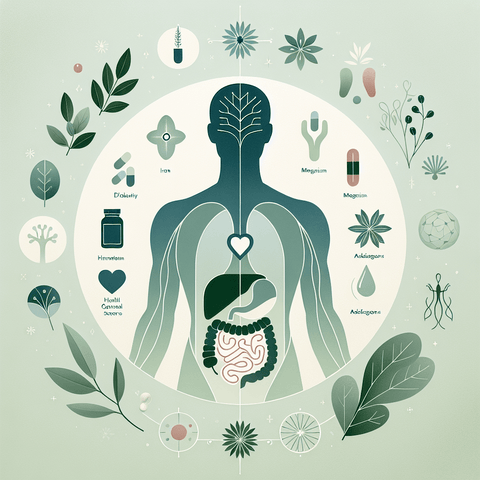Introduction
Extreme fatigue is more than just being tired. It’s a prolonged, debilitating symptom that affects millions of people globally and can stem from a myriad of causes. Among these, nutritional deficiencies are a prominent—yet often overlooked—factor. Unlike temporary exhaustion, chronic fatigue often arises when your body lacks the essential nutrients it needs for energy production, adrenal support, oxygen transport, and other physiological processes.
Modern lifestyles filled with stress, processed foods, and limited exposure to sunlight can lead to suboptimal nutrient intake. Over time, these deficiencies can snowball into a state of chronic exhaustion, hampering daily functioning and overall well-being. Fortunately, identifying and correcting nutritional gaps through dietary improvements and supplements can help restore vigor.
This article explores specific deficiencies commonly linked to extreme fatigue—from iron and vitamin B12 to magnesium and omega-3 fatty acids. It also explains the vital role adrenal health plays in managing energy and how chronic stress can deplete your nutrient stores. If you’ve been wondering what’s sucking the life out of your energy levels, the answers may lie in your nutrition. Join us as we uncover the root causes of deficiency-related fatigue and the steps to reclaim your vitality.
1. Fatigue Deficiency: The Crucial Role of Nutrients in Energy Levels
A "fatigue deficiency" isn't a diagnosis per se but rather an umbrella term indicating that your fatigue may be rooted in insufficient nutrients critical for energy production. The body’s ability to generate energy relies heavily on macronutrients like carbohydrates, fats, and proteins—as well as micronutrients including vitamins and minerals. When your nutritional intake cannot meet your body's metabolic requirements, fatigue becomes a likely consequence.
Central to the energy-yielding process are nutrients like B complexes, iron, magnesium, coenzyme Q10, and vitamin C. These help facilitate ATP (adenosine triphosphate) generation in mitochondria—your cellular powerhouses. When any of these is low, metabolic dysfunction ensues, manifesting in persistent lethargy.
Warning signs of a nutritional fatigue deficiency may include dry skin, poor concentration, frequent infections, muscle weakness, dizziness, and sleep disturbances. Importantly, these symptoms often overlap with other conditions, which makes it crucial to consult a healthcare practitioner for proper diagnosis via physical examinations and laboratory assessments.
Tailored supplementation plays an essential role in correcting deficiencies. However, not all supplements are created equal. It’s important to rely on high-quality, clean-label brands that comply with safety and efficacy guidelines. Categories like magnesium for energy, muscle, and bone support and vitamin C for antioxidant support are foundational for those addressing fatigue.
Ultimately, fatigue arising from nutritional inadequacy can be reversed. A balanced diet complemented by smart supplementation, under professional supervision, can restore the body's biochemical balance and bring back lost energy.
2. Adrenal Fatigue: How Stress and Hormonal Imbalance Lead to Exhaustion
Adrenal fatigue is a term that describes a state in which your adrenal glands, overwhelmed by chronic stress, can no longer function optimally. While it's not an officially recognized medical diagnosis, the concept is based on real physiological responses. When under stress, the adrenal glands release cortisol—a hormone essential for maintaining alertness, blood sugar levels, and inflammation control. However, prolonged stress can dysregulate normal cortisol rhythms, leading to overwhelming fatigue.
Other symptoms may include brain fog, decreased motivation, cravings for salty or sugary foods, and a weakened immune response. Sleep issues, digestive disturbances, and mood changes are also common. Factors contributing to adrenal exhaustion include poor sleep hygiene, the consumption of processed foods, stimulants like caffeine, night-shift work, and emotional stressors.
The role of nutrition in combating adrenal fatigue is enormous. Nutrients like vitamin C—stored in large quantities in adrenal tissues—play a central role. Alongside it, B vitamins, particularly B5 and B6, facilitate cortisol production, while magnesium supports hormonal balance and muscle relaxation. Supplementing with vitamin C and magnesium can help support adrenal function and aid in recovery from chronic fatigue.
Some also turn to adaptogenic herbs like rhodiola, ashwagandha, and eleuthero to assist the adrenal response. While more research is needed, these plant-based supplements may help modulate stress responses safely and effectively.
Scientific literature supports individualized nutrient therapy to counteract the physiological strain stress imposes on the adrenals. Lifestyle interventions—such as stress reduction practices, quality sleep, and low-glycemic diets—can further enhance recovery and long-term resilience. Recognizing adrenal involvement in chronic fatigue is one step closer to restoring natural energy levels.
3. Iron Deficiency Symptoms: The Hidden Culprit Behind Persistent Fatigue
Iron deficiency is among the most common nutritional shortfalls worldwide, particularly among women of reproductive age, vegetarians, and individuals with underlying health conditions. Since iron plays an essential role in hemoglobin production for oxygen transport, even a moderate deficiency can cause reduced oxygen delivery to tissues—resulting in fatigue, weakness, and diminished exercise tolerance.
Other clinical signs include pale skin, brittle nails, headaches, cold extremities, and shortness of breath. When iron stores fall considerably, iron-deficiency anemia can develop, further compromising the body’s energy levels. Causes of iron deficiency vary and may include inadequate dietary intake, gastrointestinal malabsorption (such as in celiac disease), or chronic blood loss, commonly from menstruation or ulcers.
Corrective strategies focus on both dietary and supplemental iron. Dietary sources rich in heme iron (animal-based) include red meat, poultry, and fish, while non-heme iron (plant-based) includes lentils, beans, and spinach. Because the body absorbs heme iron more efficiently, vegetarians often require higher iron intake or supplementation to meet physiological needs.
Iron supplementation must be approached cautiously to prevent side effects like constipation and the risk of iron overload, especially if taken long-term without supervision. It is crucial to have iron levels evaluated through ferritin and hemoglobin blood tests before initiating supplements. Co-supplementation with vitamin C may enhance non-heme iron absorption from plant-based diets, making vitamin C supplements highly useful in this context.
Long-standing fatigue that does not resolve with improved sleep or stress management should prompt an evaluation for iron status. Proper diagnosis and evidence-based supplementation can dramatically improve both physical vitality and cognitive performance.
4. Vitamin B12 Shortage: A Leading Cause of Anemia and Extreme Exhaustion
Vitamin B12, or cobalamin, is vital for neurological function, red blood cell formation, and DNA synthesis. Its deficiency often manifests in ways similar to other energy-depleting conditions—tiredness, memory issues, irritability, and numbness in extremities. Because it’s primarily found in animal-derived foods, vitamin B12 deficiency disproportionately affects vegans, vegetarians, and the elderly, particularly those with atrophic gastritis or impaired absorption.
One of the hallmark symptoms of a B12 deficiency is megaloblastic anemia—a condition characterized by large, inadequately formed red blood cells that fail to carry sufficient oxygen. This directly results in chronic fatigue and weakness. People with disorders such as Crohn’s disease, celiac sprue, or pernicious anemia are at higher risk due to their impaired ability to absorb B12 in the small intestine.
Diagnosis typically involves tests for serum B12 levels, homocysteine, and methylmalonic acid. Treatment can range from oral supplementation to intramuscular injections, depending on the severity and the absorption capability of the individual. Supplementation is especially crucial for plant-based eaters who might not obtain sufficient B12 from dietary sources.
B-complex vitamins work synergistically, and a deficiency in one often indicates an imbalance in others. Supplementing with a full-spectrum B complex is often advisable to combat fatigue and support nervous system health. Consider browsing ranges like high-quality B12 and B-complex supplements from providers like Topvitamine, ensuring optimal nutrient bioavailability.
Correcting a B12 deficiency can lead to rapid improvements in energy, mood, and cognitive clarity. As with other deficiencies, early intervention and maintenance with dietary and supplemental management are key for long-term vitality.
5. Chronic Exhaustion Causes: Beyond Dietary Deficiencies
Though nutritional deficiencies are a major contributor to fatigue, they are not the only cause. Chronic exhaustion can also be the result of long-standing illnesses, hormonal imbalances, persistent inflammation, or immune dysfunction. Conditions such as chronic fatigue syndrome (CFS), fibromyalgia, thyroid disorders, and Lyme disease are often associated with unrelenting fatigue that does not resolve with sleep or rest.
Hormonal imbalances—particularly in cortisol, thyroid hormones (T3, T4), and insulin—can severely disrupt metabolic processes. Inflammation from autoimmune diseases or persistent infections further strains metabolic reserves and nutrient utilization. A thorough diagnostic workup, including hormonal panels, inflammatory markers, and lifestyle assessments, is indispensable in these complex cases.
Targeted nutritional support becomes part of a holistic recovery strategy. Omega-3 fatty acids reduce inflammation and support neurological function—making DHA and EPA omega-3 supplements highly beneficial for fatigue patients. Magnesium is another universal aid, as it's involved in over 300 enzymatic reactions affecting energy, muscle function, and neurotransmitter balance. Explore options in the Magnesium Benefits collection.
Probiotics and digestive enzyme supplements also support gut health—a crucial factor in nutrient absorption and overall immune performance. Coupled with lifestyle practices like movement, mindfulness, and restorative sleep, nutritional therapy can significantly reduce the burden of chronic exhaustion.
6. Stress-Related Fatigue: How Emotional and Physical Stress Deplete Nutrients
Stress is one of the most underestimated but potent contributors to nutrient depletion. When the body experiences emotional or physical stress, it enters a "fight-or-flight" mode, increasing the demand for specific nutrients—particularly B vitamins, vitamin C, magnesium, and zinc. These nutrients are rapidly utilized to fuel stress responses and support adrenal gland activity.
Persistent stress—whether from work, relationships, unresolved trauma, or inflammation—tends to create a vicious cycle. It saps energy and reduces the appetite for nutrient-dense food, further compounding deficiencies. Symptoms of stress-induced nutrient depletion include poor concentration, mood swings, irritability, tension headaches, and muscle spasms. Over time, nutrient levels become too low to support biochemical functions necessary for sustained energy and emotional resilience.
Supplements like magnesium and vitamin C can help reverse this pattern. Stress-reducing practices like meditation, controlled breathing, and physical activity further enhance the effectiveness of nutritional strategies by lowering baseline cortisol levels. Combining these interventions ensures that the body can maintain its nutrient reservoir even in high-stress environments.
Making long-term adjustments to diet, lifestyle, and supplementation not only improves resilience to stress but also acts as a preventive measure against fatigue. By proactively managing stress and its impact on nutrient depletion, individuals can break the cycle of fatigue and regain control over their well-being.
Conclusion
Extreme fatigue can be a complex puzzle, but nutritional deficiencies often represent critical, modifiable pieces. Key nutrients like iron, vitamin B12, magnesium, B-complex vitamins, and omega-3 fatty acids each play vital roles in energy metabolism, oxygen transport, and stress resilience. Identifying and addressing these deficiencies through thorough diagnosis and high-quality supplementation is essential.
Adrenal function and stress management are equally crucial in assessing fatigue. Chronic stress depletes nutrient stores and leads to hormonal imbalances, making it imperative to not only restore what is lost but also develop practices that reduce stress at its source. Chronic and unexplained fatigue may also point to underlying health conditions that warrant comprehensive evaluation and personalized strategies.
If you are struggling with extreme fatigue, don't dismiss it as a byproduct of a busy life. Consult a healthcare provider to assess your nutritional status and design a tailored plan that includes appropriate supplements, dietary adjustments, and lifestyle changes. Your energy levels—and quality of life—depend on it.
Q&A Section
1. Can a single vitamin deficiency cause extreme fatigue?
Yes, deficiencies in single nutrients like vitamin B12 or iron can significantly reduce energy levels due to their roles in oxygen transport and cellular energy production.
2. How can I tell if my fatigue is due to a deficiency?
Common signs include muscle weakness, pallor, irregular heartbeat, poor concentration, and numbness. Blood tests provide definitive data on your nutrient levels.
3. Are supplements enough to cure fatigue?
Supplements can help correct deficiencies, but they work best when paired with a balanced diet, stress reduction, and treatment of underlying medical conditions.
4. How long does it take to feel better after starting supplements?
Depending on the deficiency, improvements can be seen in a few days to a few weeks. B12 injections, for instance, often yield rapid results. Iron therapy might take longer.
5. Can stress alone deplete nutrients?
Yes, chronic stress increases the body’s demand for certain nutrients like B vitamins, vitamin C, and magnesium, which can lead to deficiencies over time.
Important Keywords
- extreme fatigue
- nutritional deficiency
- iron deficiency symptoms
- vitamin B12 shortage
- adrenal fatigue
- chronic exhaustion
- fatigue causes
- stress-related fatigue
- magnesium supplements
- vitamin C supplements
- omega-3 for fatigue
- energy metabolism
- B-complex vitamins
- supplements for energy
- deficiency diagnosis



